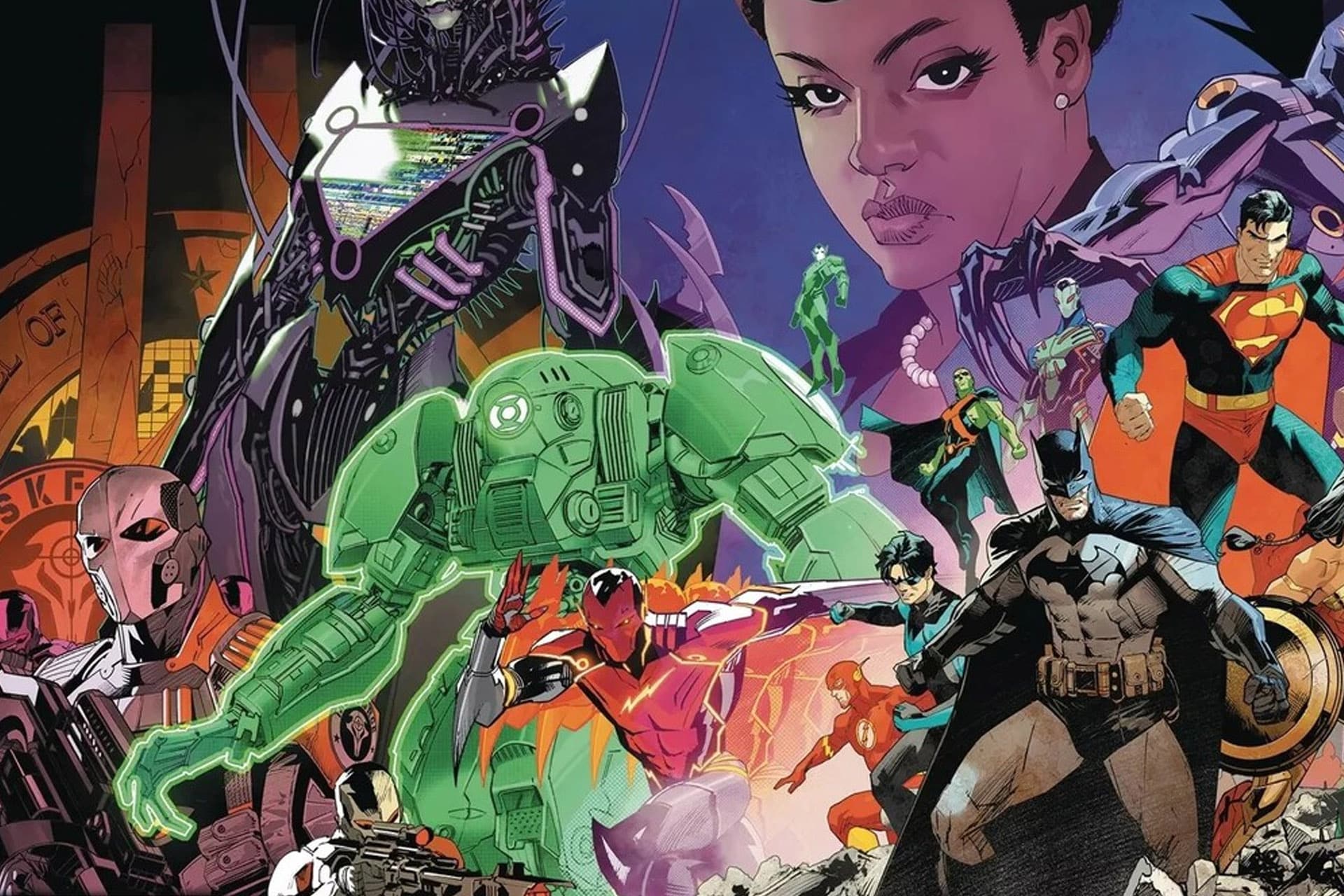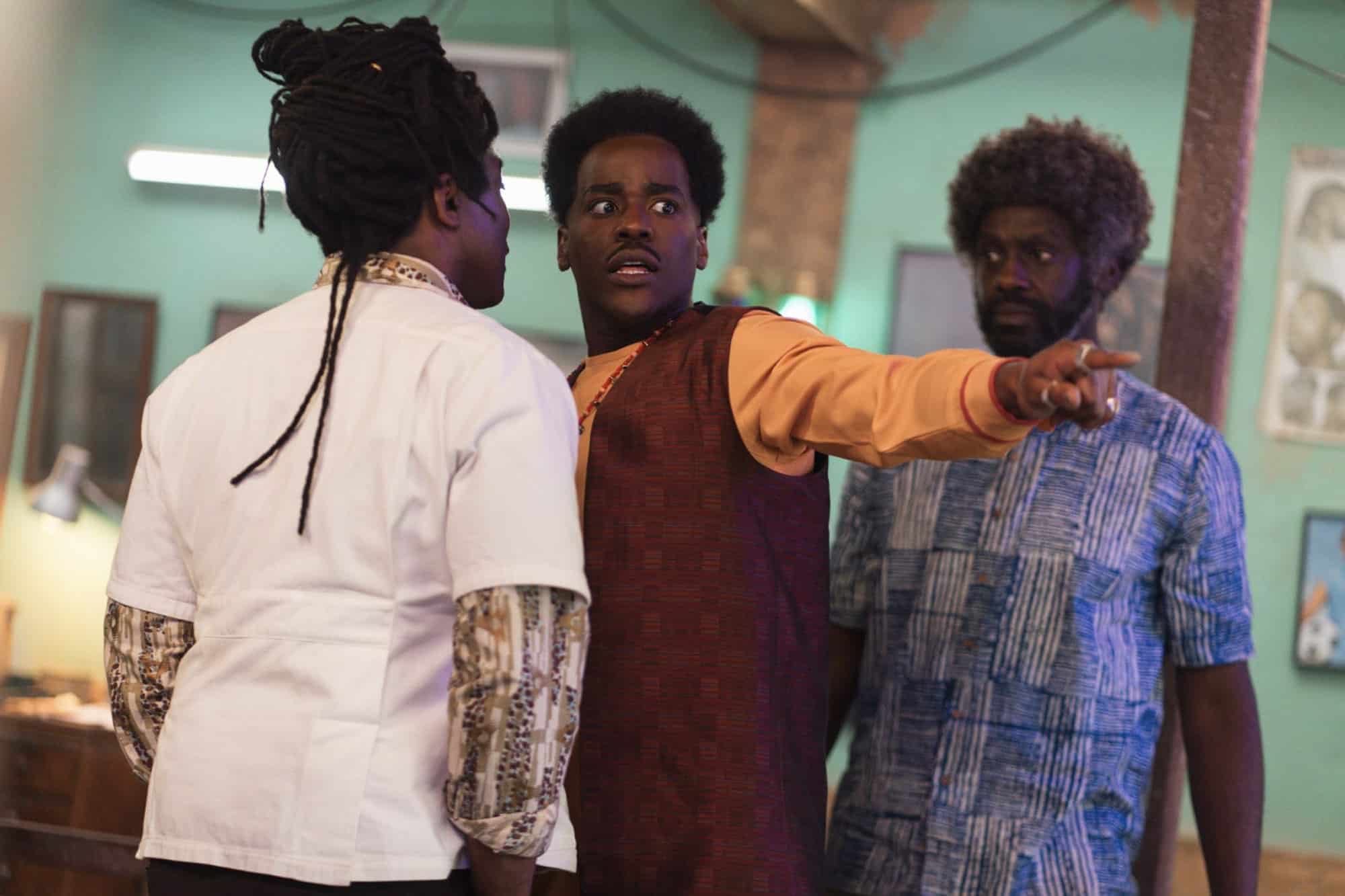- Series: 10
- Episode: Five
- Duration: 50 minutes
- Writer: Jamie Mathieson
- Director: Charles Palmer
Don’t mean to hurry you, but in 700 breaths I’ll be dead”
Was it only two episodes ago that I hailed Sarah Dollard, against some competition, “one of the Twelfth Doctor’s greatest writers”? It didn’t take long for that competition to show up — and it’s neither unexpected nor the most obvious.
When Matt Smith left after an all-too-short three series and a few specials, show-runner Steven Moffat faced a unique legacy in New Series Doctor Who. Predecessor Russell T Davies may have steered two Doctors through time, but Christopher Eccleston’s speedy departure saw the show shaped into the worldwide success it remains through his collaboration with David Tennant’s Tenth incarnation. Moffat was unlikely to oversee a Thirteenth Doctor (although the War Doctor was a wry surprise), but was probable to see out most or all of the Twelfth Doctor’s life. So it turned out. But on the searing form of Series 10, even five episodes in, it’s clear that the mid-term question wasn’t which of those two Doctors would prove to be Moffat’s definitive.
While Moffat’s undoubtedly the authoritative writer of the Eleventh Doctor, steering him through preposterously complicated tangles, that mantle fell to Moffat’s commissions with the arrival of his successor. Another way to look at it: Moffat’s appointed some fresh but established writers who’ve done to his Doctor what he did to those under Russell T Davies’ care. That may not be a blindingly apparent as the stark, unexpected, stand-alone brilliance of Series Three’s Blink, a brilliant, still a heavy chain around Moffat’s neck. But writer Jamie Mathieson has a claim to serving up the current Doctor’s greatest moments with his eclectic set of episodes.

Mathieson penned the best episodes of the show’s eighth series: the space-period thriller Mummy on the Orient Express and, the radically different, concept-breaking, contemporary Flatline. As original, affecting and unnerving as the latter was, the joyous buzz of Mummy has seen it rise to New Series classic status three years on. He was stuck in the middle of Series Nine, co-writing The Girl Who Died with Moffat; not an outstanding entry, but pivotal to this incarnation of the Doctor and that year’s muddled arc. And here he is popping up in Series 10, producing an episode that might prove to be the epitome of this series’s ethos.
Any quibbles with the series so far — weak pre-titles, fudged endings, some over-familiar concepts — all become strengths in Oxygen. And mostly, it pays off.
From the classroom
“So, how does space kill you”
Oxygen doesn’t clamour for breathing space; it makes a clear stab for Who greatness. It’s confident and assured from aniconic opening that evokes The Wheel in Space as much as big screen sci-fi — there’s even a loaded yo-yo dissolve right at the end to get us all sub-2001. Those wheeling corpses may not make a great deal of sense, but unike Smile, the only other time new companion Bill’s travelled to the far future, Oxygen doesn’t fudge it’s opening lines. It packs in danger, mystery and emotion before the titles, and even a wry nabbing of the Moffat ‘comms’ trope.
Cut to the Doctor’s new home after those titles and Oxygen’s success in marrying new and old is set. In fact, it makes for a rather wonderful sequel to The Pilot. How strange this series is proving such fun. The one-liners have paled, or hardened, over the course of the Twelfth Doctor’s life — although you wouldn’t really know lifting a page of this script — and the tenth year has put a renewed emphasis on characterisation. The Doctor’s lecture on the dangers of space aren’t the first time we’ve been reminded that the universe is deadly this term. But it works as a a skull-backed, one line pay-off as much as expert foreshadowing for the danger the crew will confront a mere few hours in their future. Lungs explode, blood vessels swell, sweat and saliva boil… What did the Doctor say to Bill not so long ago? “No one’s from space.” Of course he’s not from space… But a clear component of the show, from the moment the TARDIS landed in that petrified forest on Skaro, is that there’s a strange and dangerous compulsion out there. And that’s what the show’s rediscovered so perfectly through Bill Pott’s eyes.
“That is my theme tune, otherwise known as a distress call”
Aboard the TARDIS Mathieson, a man who once shrunk the space-time ship, does his fine spin on classic console room chat — the drawn-out camping analogy could have developed with any number of previous incarnations. but it’s not just that. Capaldi and Lucas are hilarious in the full banter. But the real treat in the console room is Bill’s complete disinterest in mention of the vault (“You took an oath sir, the vault cannot be left unguarded”), as much as her joyous, distracted, joyous laughter as the TARDIS takes flight.
The Team
“You’re missing it, aren’t you?”

We may have left Bill’s introductory arc, but this is the first time we’ve the all-new TARDIS crew’s been given time to uncover a mystery together — The Pilot was a desperate rush. And it’s already clear that time will always be too short with this bunch. A former stand-up, Mathieson serves up some fine zingers for the Doctor and Nardole over Oxygen’s 45 minutes (“The absolute horror — Can you imagine how unbearable I’m going to be when I pull this off?”), but he keeps the crew’s relationship at the heart. Of note is Matt Lucas’ Nardole — a changed character from the one seen in The Husbands of River Song. The TARDIS banter manages to scrape up some of his mystery, some thing that’s lain pretty fallow so far this series, but his attitude doesn’t stay on board the ship. His knowledge, mission and snarky irritation is refreshing rather than annoying. (“Yes, I was really hoping that someone would point out the obvious). And that’s even with stagey lines like, “Some of my best friends are bluish”.
As we’ve some to expect this series, there’s the flash of the Fourth Doctor in Capaldi’s Time Lord, and that doesn’t stay on Earth either. In space, the Doctor’s purpose recalls that incarnation as much as his circumstance. It’s in strong links to a Tom Baker classic that Oxygen’s tested.
Under siege
“You’ve become inefficient”
Oxygen may rise above the flaws of its concept — but it’s not able to obliterate them in the vacuum of space. Part of the fault is that while a superior example, it’s a generic base under siege story; that classic and well oiled formula that’s tested almost every Doctor since the show’s first regeneration. We were last caught in one in Series Nine’s Sleep no More and, to a lesser extent, this year’s Smile. Neither of those episodes are classics. A sign, as if one was needed, that the base under a siege is a well-worn concept.
Other original Who elements continue to invite interest and excitement; siege stories invite immediate comparison with each other, and serve up inevitable repetition. Of course Mathieson knows the issues. His first Who script was a twist on the base under siege. And while Oxygen has to fall into some classic traps of the format, Mathieson lifts it with a few jaw-dropping scenes.
Direct questioning
“I’m maxing out your adrenalin, fear keeps you fast, fast is good”.
Oxygen is a necessary shot in the arm to a format that could have posed this series second big stumbling block (after, of course, the entrance of the companion). Series 10 is closing on the best run of Doctor Who in the new era and its competition’s held the prize for some time.
With the honourable exception of the rushed, gutted, wasted and scuppered The Curse of the Black Pearl, I always take the first half season of the show’s sixth year as the best continuous run of Who stories to date. In fact, it wasn’t rivalled until Series Nine, an all too brief year, itself ultimately scuppered by failing to deliver on the menace of its arc. Uncoincidentally, that run of Series Six episodes ended with the superb Gangers/The Almost People two parter — the shows last multi-part story for three years, which threatened to end base under siege stories for ever with its tale of insidious duplication. There’s a heavy smudge of that story in Oxygen, in tone, pitch and application. A heavy ethical and capitalist dimension was at the centre of Matthew Graham’s 2011 tale, and the same is true of Mathieson’s.
While the secret at the heart of Gangers would soon emerge as a mode of weapon against the Doctor, Oxygen sits in the series like punctuation. Capitalism is the root of the show’s evil, and come the episode’s end these events are seen as capitalism’s final act. A similar moral along with constituent historical aspects lurked beneath the surface of Sarah Dollard’s Thin Ice two weeks ago. And in a series that’s refusing to give us traditional monsters, it’s a noticeable recurring theme, as finite bordering nihilistic as Oxygen gets. A preponderance of the same type of monster (robots in the first half of Series Eight) or nothing terribly tangible at all, has done in for New Who in the past. But Oxygen’s refusal to produce a bug eyed monster is further proof that Series 10 is getting a lot of things right.

The right influences
Most of all, Oxygen knows how to borrow wisely from right base under siege stories. There’s great call-back to Mathieson’s own Mummy on the Orient Express, from the Doctor’s impatient, seeming disregard for lives at the heart of the mystery, as much as the unseen authority pulling strings somewhere far away. The concepts of personalised oxygen supplies and space suits as habitat are strong, acting as a fine metronome to raise the pace of the piece up as soon as the puzzle’s unravelled. But there’s an internal logic to it that can’t live much beyond the end credits. What is exactly the benefit of killing so few workers with their own dwindling Oxygen supplies? Oxygen’s one thing, but what about every other commodity?
That’s not perfect in the finely scrutinised world of Doctor Who, but the ambition powers it through. This is the closest Who has come to its own spin on Weylan-Yutani, the ‘Company’ from the Alien film series. Who’s inevitably crossed concepts with that sci-fi horror in the past. But the writer who crafted not only one of the finest siege stories, but the one most comparable to Oxygen, penned it a good half a decade before Ridley Scott’s classic burst onto the big screen in 1979. Before anyone every heard anyone scream in space, Robert Holmes’ Ark in Space, set a compelling template.
As with Ark in Space, this TARDIS crews take its time to stumble around the apparently abandoned station, uncovering clues to the distress beacon they received before they’re rudely interrupted. It’s a third of the episode before they contact with the surviving crew members and it’s hard not to think of Ark when the Doctor marvels, “Look at this classic design”.
“Air costs. Save your breath”
True, some of Oxygen’s beats are a bit staged, like the air expulsion of the episode that immediately follows the characters’ dawning realisation. But it has a point, undermining the TARDIS abilities, or attempt, to destroy the story’s concept upon her arrival with an expanded oxygen bubble. Perhaps the least predictable tale in Series 10 so far, Oxygen’s main strength is in serving up some stunning and unpredictable scenes in the middle of the siege. Oxygen is mostly confrontational — when we first meet a corpse, it’s a bloody disgusting one.

Walking dead
“I tell you what’s disrespectful, whatever killed him”
It’s not that long since we saw corpses sitting dead prisoner to the space suits around them. It’s perhaps another deliberate, and cocky attempt to twist a Moffat visual. But this time there isn’t a clean skull, but a blue, decaying, lifeless head. Bill’s response is suitably superb (“Yeah, can you turn it off?”) — yes, Oxygen’s the Aliens to Silence in the Library’s Alien. This time we’re let into the suits, albeit through a massive assumption on the Doctor’s part.
“Unlicensed oxygen supply”
And Bill, poor old Bill. Her malfunctioning suit is a little convenient, even if the script accounts for it, but it leads to the episode’s most shocking scene. Indeed, it’s the hapless companion’s arbitrary problems that raise the pace and elevate Oxygen to the upper half of base under siege stories. Nardole may run through some emotions, but Bill really runs the gamut from life to death in this episode. It may give her time to experience some space wonder early on, in the best companion tradition, (“Doesn’t feel like space” — “Ah, now it feels like space”), but it’s, er, welcoming to see her so scared when it counts. She’s not cocky like Amy or Clara — the latter of whom was refusing to stay put, and running into dark rooms with naked Ice Warriors by this point in her and the Doctor’s relationship.
And how long has it been since a companions been killed off? Have they ever been killed off so grimly. Mathieson set the stakes high, and he sure wrings it. The direction Bill’s ‘first death’ in the airlock, inevitably ready to fall to the Doctor’s earlier blunt methods, is superb. In the disorientation, there’s even time for a glimpses of a retro space battle. The sequence is only diminished when stakes are further raised the other side. We’ve wondered from Moonraker to a Romero film, with zombies kept at bay by a lack of map — which may as well be an electric fence holding back the horses. And then of course, the revelation that the Doctor’s sacrifice has left him blind.
“Average breaths, the only unit worth a damn round here”
Even with this disability,
Come the end, the callous Doctor ruse Mathieson digs out is painful to watch. There’s the hint of Mummy in it — but that was part of the fabric of the ‘Am I a good man’ arc. Four episodes into his Who career and the writer’s already referencing his own tropes. It comes close to not working on the back of Bill’s horrid execution; the concept of dying well is as deeply uncomfortable as the Doctor is off-kilter. But another Oxygen’s success is that it works to an internal logic built from the beginning, which other Series 10 epsiodes have struggled with. And to think the Doctor pulls it out the bag with an astonishing pun-cum-episode summary: “We’re fighting the suits”

Blind turn
And then there was the cliffhanger, the Doctor’s revealtion that he’s still blind. Capaldi’s closing sentences were apparently re-recorded to provide a more satisfactory emphasis. Still, against the black screen it can’t quite lose a sense of melodramatic comedy. It’s a little unfair to link it to the like ‘Adric silence’ misjudgment that ended 1982’s Earthshock, but delaying the Next Time trailer doesn’t help. In turning Oxygen into a part one, it falters; the hermetic seal a bit loosened.
But if the episode’s going to be undermined, let it be right at the close and for the sake of the greater arc. At least this is a fitting place for a reference to blindness. It was the Fourth Doctor’s era that notable saw, if only temporary, cases of blindness, from Sarah Jane in The Brain of Morbius, to Leela in The Horror of Fang Rock. But it’s not something that usually happens to the Doctor. As this series’ greatest trick becomes apparent; the Doctor’s trapped on Earth, trapped without vision. And events are tightening around him.
“Do you know what’s wrong with this universe? believe me, I’ve looked into it”
Stunning moment
“Please remain calm as your central nervous system is disabled
In an episode of a few shocks, most jaw-dropping was Bill’s electrocution. The end resolution, although he suit’s issues were laboured (and we all know issues with batteries), is mildly unsatisfactory. Still, there’s no denying the shock of the companion dying, or the heart-wrenching way she calls for her mum. helpless in the face of death and we’re left with the Doctor’s lie. I don’t think any part of Whodom’s made me leap to my feat since Torchwood Miracle Day’s shocking oven interlude. A bold move.
“Just tell me a joke before you go.” Did I say? Oxygen doesn’t pull any punches.
Everyday hook of the week
“What if this is just business, business as usual?”
We’ve already had emancipation at the root of 19th century capitalism in Dollard’s Thin Ice, here it’s combined with that old friend, oxygen. All at the end of a algorithm, controlled by the faceless, putting a value on all life. It’s all an antidote to the wonder of space. For once it’s the failing batteries that save the day. But no matter the centurywe can always rail against the man.
Doctor look of the week
A horribly ironic title to this section, in retrospect. But I fear it’s going to get worse next week. As horrifying as that turn of the Doctor’s head is… we’ll opt for his scream when the sonic screw driver is destroyed by the first suit the TARDIS crew encounter. Vintage disgust.
Production touch of the week
“The one thing we can’t waste”
The design is “classic” indeed. Everything in the episode shouts the kind of space-action sci-fi we’ve been waiting for. But there’s nothing better than the space walk of the undead on the bows of the mining station Chasm Forge.
A Jokerside view
I see a mash-up where the skull suited Vashta Nerada endlessly pursue the robot suits around a deserted space station. Or a silent library. Under a Lake. “Hey, who gave you the rights?”
Vault action
“I try never to tell the enemy my secret plan”
The vault chat at the end of Oxygen is pretty laboured stuff, especially considering the episode provides precious few hints as to who or what’s inside. Missy’s split-second appearance in the Next Time trailer is a clear red-herring, even though resolutions to Moffat conundrums often take the course of least resistance. With the running theme of human value and capitalism I’m now prone to thinking it’s a Mondassian cyberman. Sat at piano like Mark Platt’s versions in Big Finish’s The Silver Turk, the — yes, it’s a silver marionette. Who does’ children’s parties. probably.
Verdict
“We’re fighting an algorithm”
But what an algorithm this series has hit. Oxygen’s based on a heavily layered idea, which need big explaination. But it rocks along in a claustrophobic, well-realised way that barely allows you time to question the logic of defining workers in breaths. Even if that doesn’t quite cut the mustard, the heavy anti-capitalist sentiment is exactly what Doctor Who should be doing. Because, why not?
Most astonishing is that Oxygen cuts a sharp miserable and nihilistic tone through the series. It’s “the end point of capitalism, the bottom line where human life has no value at all”. And the only good news is that having solved one minor battle, the damaged Doctor will just be around for ”the human race (to) find a whole other mistake”.
It’s bold stuff, and more than an exemplary example of the worn base under siege story. Its big win is providing a strong start and a true resolutions. Like Mummy, it’s taken core issues that are simmering at the heart of the year and tied them up in a strong episode. Mathieson strikes again, elevating Moffat’s broad palette in a series that’s so far struggled to do the same.
Review previously published on Medium (May 7, 2017)









0 Comments